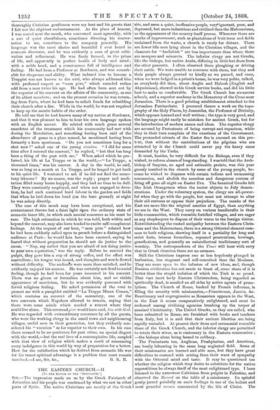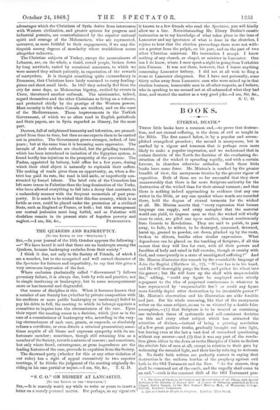THE EASTERN CHURCH.—H .
[TO TER EDITOR OF TUE "SPECTATOR.")
Stn,—The impression made on us by the Greek Patriarch of Jerusalem and his people was confirmed by what we saw in other parts of Syria. The native Christians are mostly of the Greek
rite, and seem a quiet, inoffensive people, verrignorant, poor, and depressed, but more industrious and civilized than the Mahometans, as the appearance of the country itself proves. Wherever there are marks of improvement, such as plantations of fruit trees and fields reclaimed from the waste, a church is rarely far distant. There are fewer idle men lying about in the Christian villages, and the clamours for " backshish " are less importunate than where there are mosques and minarets. The inferior clergy are not Greeks, like the bishops, but native Arabs, differing in little but dress from the other peasants. I often observed them ploughing or driving their cattle. We were unable to converse with them, but they and their people always greeted us kindly as we passed, and once, when we were lodged in a priest's house, he was very polite, talked, as everybody did then, about Angliz and Habesh (English and Abyssinians), showed us his Greek service books, and did his little best to make us comfortable. The Greek Church has numerous schools, and a superior academy in the Monastery of the Cross near Jerusalem. There is a good printing establishment attached to the Jerusalem Patriarchate. I procured thence a work on the topo- graphy of the Holy Places, by Joannides, the Professor of Divinity, which appears learned and well written ; the type is very good, and the language might easily be mistaken for ancient Greek, but for the introduction of modern names and ideas. The superior clergy are accused by Protestants of being corrupt and rapacious, while they in their turn complain of the exactions of the Government. The pretended miracle of the Easter fire is excused on this pre- text, that without the contributions of the pilgrims who are attracted by it the Church could never pay the heavy sums demanded by the Turks.
It must, besides, be very difficult for the Bishops, even if they wished, to reform abuses of long standing. I was told that the Arch- bishop of Smyrna, an aged and estimable prelate, was this year grossly insulted in the church by some of the young people, be- cause be wished to dispense with certain tedious and unmeaning ceremonies, and abolish the senseless and dangerous custom of firing off guns all night on Easter Eve. The fanatical Greeks felt like Irish Orangemen when the rector objects to July demon- strations. Under the voluntary system, the clergy are all-power- ful when they go with the people, but must not attempt to alter their old customs or oppose their prejudices. The monks of the East are more like the original ascetics of Egypt, than anything we see in the West. They carry on various handicrafts in their little communities, which resemble fortified villages, and are eager as any shopkeepers to dispose of their wares to the foreign visitor. Notwithstanding the rooted antipathy between the Eastern Chris- tians and the Mahometans, there is a strong Oriental element com- mon to both religions, showing itself in a partiality for long and strict fasts, intense formalism, repeated prostrations, bowings, genuflexions, and generally an unintellectual traditionary sort of worship. The correspondents of the Times will hear with envy that in Greek churches there are no sermons.
Still the Christians impress one as less hopelessly plunged in barbarism, less stagnant and self-conceited than the Moslems. They are more open to the infusion of new ideas, and, though Russian civilization has not much to boast of, some share of it is better than the stupid isolation of which the Turk is so proud. That vast inert body Eastern Christendom, being regarded as spiritually dead, is assailed on all sides by active agents of prose- lytism. The Church of Rome, backed by French influence, is filling the country with missionaries,—Franciscans, Jesuits, &c. Reactionary and unprogressive as Romanism appears in the West, in the East it seems comparatively enlightened, and must be reckoned among civilizing agencies breaking up the torpor of nominal Christianity. The United Greeks, as they are called, who have submitted to Rome, are furnished with books and teachers from Italy, but it is said that their ancient liberties are being rapidly curtailed. At present their dress and ceremonial resemble those of the Greek Church, and the inferior clergy are permitted to retain their wives, as is customary in the Eastern communion ; —the bishops alone being bound to celibacy.
The Protestants too, Anglican, Presbyterian, and American, are busily labouring in the same long neglected field. Some of their missionaries are learned and able men, but they have great difficulties to contend with arising from their want of sympathy with the Oriental mind and taste. It may be questioned too whether the religion which they desire to substitute for the native superstitions be always itself of the most enlightened type. I have listened to the narrowest Calvinism from pulpits in Palestine, and observed the Record on the table of a missionary. Its spiteful gossip jarred painfully on one's feelings in one of the holiest and most peaceful scenes consecrated by the life of Christ. The
advantages which the Christians of Syria derive from intercourse with Western civilization, and greater aptness for progress and industrial pursuits, are counterbalanced by the superior national spirit and courage of the Mahometans, who are represented, moreover, as more faithful to their engagements, if we may dis- tinguish among degrees of mendacity where truthfulness seems altogether unknown.
The Christian subjects of Turkey, except the mountaineers of Lebanon, are, on the whole, a timid, cowed people, broken down by long servitude, varied by occasional massacres, to which we were assured they submit patiently, in expectation of the rewards of martyrdom. It is thought something quite extraordinary in Damascus, that Christians have lately ventured to carry fowling- pieces and shoot small birds. In 1867 they actually fled from the city for some days, as Mahometan bigotry, excited by events in Crete, threatened another outbreak. The missionaries, indeed, regard themselves and the other Christians as living on a volcano, and protected chiefly by the prestige of the Western powers. Most security is felt where Consuls are resident, and on the coast of the Mediterranean. Those improvements in the Turkish Government, of which we so often read in English periodicals and State papers, are in Syria regarded as illusory, for the most part.
Decrees, full of enlightened humanity and toleration, are promul- gated from time to time, but then no one expects them to be carried out in practice. The Government grows stronger, indeed, of late years ; but at the same time it is becoming more oppressive. The inroads of Arab robbers are checked, but the grinding taxation, which has been introduced in imitation of the Egyptian system, is found hardly less injurious to the prosperity of the province. The Pashas, appointed by bribery, hold office for a few years, during which their chief object is naturally- to replenish their coffers. The making of roads gives them an opportunity, as, when a dis- trict has paid its rate, the road is laid aside, or imperfectly con- structed by forced labour. The brief rule of the Crusaders has left more traces in Palestine than the long domination of the Turks, who have allowed everything to fall into a decay that contrasts in a melancholy manner with the frequent memorials of past pros- perity. It is much to be wished that this fine country, which is as fertile as ever, could be placed under the protection of a civilized State, such as England or France, or both ; but this arrangement our mutual jealousies must long forbid, and so Palestine will doubtless remain in its present state of hopeless poverty and



































 Previous page
Previous page